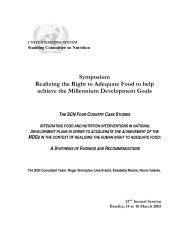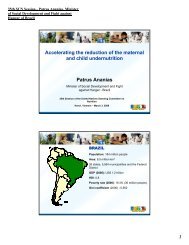Universal Salt Iodization (USI) - FTP Directory Listing
Universal Salt Iodization (USI) - FTP Directory Listing
Universal Salt Iodization (USI) - FTP Directory Listing
- No tags were found...
You also want an ePaper? Increase the reach of your titles
YUMPU automatically turns print PDFs into web optimized ePapers that Google loves.
44FEATURESforced through inspection andtesting by the RegulatoryAgencies, namely, the StandardOrganisation of Nigeria (SON)that sets the standards, and theNational Agency for Food & DrugAdministration and Control(NAFDAC) that enforces thestandards.Stringent penalties are meted outfor violators of the law, includingdestruction of non-iodized or insufficientlyiodized salt, closure offactories and payment of stipulatedadministrative fines backedup by NAFDAC Decree No 15 of1993 (as amended in 1999).Table 1: Summary of results of assessment of the Nigeria <strong>USI</strong> program (1993-2005)Year Name of Study Results1988 Pre-<strong>USI</strong> Programme in 67% TGR16 endemic states1993 Baseline Survey 40% iodization; 20% goitre rate1999 Sentinel site survey 98% <strong>USI</strong>, 11% goitre rate133.9 μg/dl median urinary excretion1999 Multi Indicator Cluster Survey 99.1% (urban) and 98.2% (rural)iodization2001 National Food Consumptionand Nutrition SurveyNAFDAC has successfully monitoredthe iodized salt market byhalting endemic corruption among government regulatory officers through:150 μg/dl median urinary iodineexcretion rate2002 National assessments Factory/Distributor: 100% iodizationRetail & Household: 98% iodization2003 NDHS 97% adequate iodization at HH level,1% inadequate2003 National Assessment 99% iodization at distributor andretail levels2005 National Assessment inhouseholds98% iodization (90.5% adequate, 7.5%inadequate) and 2% non-iodization2005 Goitre Prevalence Survey 6.2% TGR, 131 μg/dlFigure 1: Nigeria <strong>USI</strong> logo• Restructuring of regulatory processes.• Staff reorientation and motivation.• Various welfare packages including initiation andsustenance of “thirteenth” month salary.• Hard work is rewarded through recognition,commendation letters, promotions, overseas inspectionor training.• Staff members who detect defaulting companies orreport on other staff who compromise with defaultingcompanies are similarly rewarded.• Corruption is severely punished. Staff involved in aidingor abetting defaulting companies are dismissed.NAFDAC’s national network of decentralized monitoring system, with offices in all 36 states, and with FCTand laboratories in the six geopolitical zones of the country, offers a framework for effective regulation for saltmarketing through strict inspection and enforcement of the <strong>USI</strong> law.Awareness of IDD and the need for salt iodization is created and sustained through Social Marketing, withNAFDAC spearheading generic multi-channel communication campaigns on billboards, newspapers,televisions, radios, public notices, posters and publications in both English and vernacular languages. Theawareness campaign targets policy-makers, manufacturers, religious/community leaders, consumers andother stakeholders. IDD and <strong>USI</strong> awareness is now integrated into the activities of NAFDAC’s ConsumerSafety Clubs and established in Nigerian high schools.In addition to social marketing, sensitization of the public is often achieved through NAFDAC-championedhigh level advocacy that is led by the Wife of the President, Ministers of Health, Industry and Commerce, andtraditional rulers.Commitment by the salt industryThe iodization of 98% of salt consumed in Nigeria is concentrated in the hands of 5 large domestic saltcompanies, with 640,000 MT capacity per year. This makes inspection and monitoring easier. The remainingSCN NEWS # 35 back to contentswww.unsystem.org/scn







